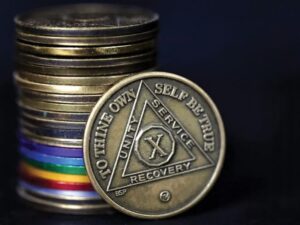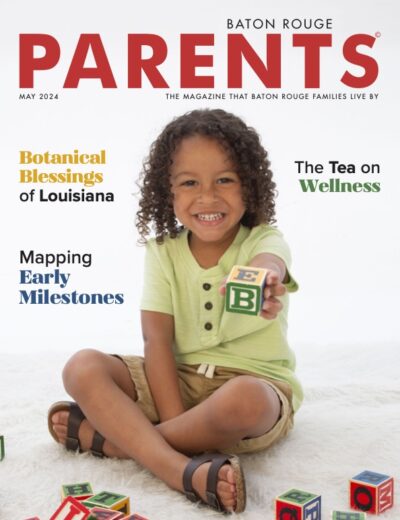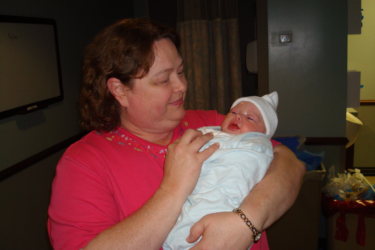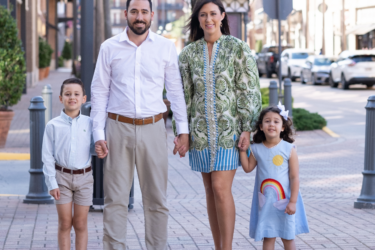
Alcoholics Anonymous
“Alcoholics Anonymous (A.A.) taught me how to live. The spiritual solution this program taught me has held up to every problem I have encountered over the last 14 years. I never have to drink again and neither does any other alcoholic—and that is an actual, literal miracle,” Nikki, a mom of two, says.
A.A. has been changing lives for over 80 years. Founded in 1935 by Bill W. and Dr. Bob, the two men modeled the program on The Oxford Group, a religious movement that practiced self-improvement by performing self-inventory, admitting wrongs, making amends, and using prayer. Within a few years, Bill and Dr. Bob developed the Twelve Step Program and wrote Alcoholics Anonymous, commonly known as the Big Book, which is still read by A.A. members. The A.A. Preamble, also read at meetings, clarifies that it is “a fellowship of men and women who share their experience, strength and hope with each other that they may solve their common problem and help others to recover from alcoholism. The only requirement for membership is a desire to stop drinking.” A.A. membership does not require any dues and is self-supporting, multiracial, apolitical, and available almost everywhere.
No matter what time you’re reading this, there is a good chance an A.A. meeting is happening in Baton Rouge. Erin, sober for 11 years, shares, “I came from a place that didn’t have very many meetings, but A.A. is so accessible here. There are 50 meetings in one day. Everywhere all the time. If I can’t make the one I want to go to, no excuse. I can find another one.” The equality that takes place in each meeting makes A.A. a unique environment. “One of the best lines in the Big Book is: ‘We are a people who would generally not mix.’ That’s one of my favorite phrases,” says Erin. “There are people who are coming for their first meeting and people who have been there for 30 years. We are all different, but we have a common bond: we are all trying to be sober and sane.”
For Nikki and Erin, going to an A.A. meeting changed their lives. They both hit rock bottom in their early 20s. Nikki was experiencing extreme anxiety and panic attacks, and she was drinking alone every day. She shares, “I was sent to A.A. by an Intensive Outpatient Program. The biggest thing I learned in treatment was that the answer to everything was in A.A. I didn’t think I was an alcoholic at first, but when I heard these A.A. people talking about the crazy things they used to think and feel, I knew that was my kind of crazy. They were talking about it in past tense, though, and through laughter and smiles. I thought, ‘Let me try this, maybe I can get a little piece of what they have.’ I got a sponsor, and we started reading the Book and working the steps. The end result was way beyond anything I could have imagined.”
A second alcohol-related arrest in six months led Erin to A.A. Her father handed her the Big Book and told her it was time. She remembers her first meeting, “I sat in that meeting on a Sunday and I cried the entire time they read ‘How It Works,’ which is part of Chapter 5 in the Big Book. Every word they read was hitting me right in the head. And I just cried and cried because I knew it was the place I was supposed to be and it was the last place I wanted to be. I am a rare case who just came into A.A. and got sober. I didn’t go to treatment. I just kept coming back and just kept not drinking.” Erin started a routine of a morning meeting, work, and an early bedtime every day for three years.
Both Nikki and Erin have sponsors and are sponsors to other women. “I talk to my sponsor regularly, and I have three-five sponsees I meet with weekly,” Nikki shares. When you’re a sponsor, you are “passing on your experience.” Erin explains, “You’re not telling people how to live their lives. You’re telling people what worked for you, and maybe it works for them. We go through the Big Book together and talk on a regular basis. We are very blessed to have this system of accountability.”
Going to a meeting is where sobriety starts. Nikki says, “I never felt like I fit in anywhere that I could be myself, but I know I can be completely authentic in A.A.” Erin wants people to know that “it doesn’t matter who you are or where you’ve come from or where you’re going. We are normal people doing normal things. We’ve just found a way of life that works for us.” ■





